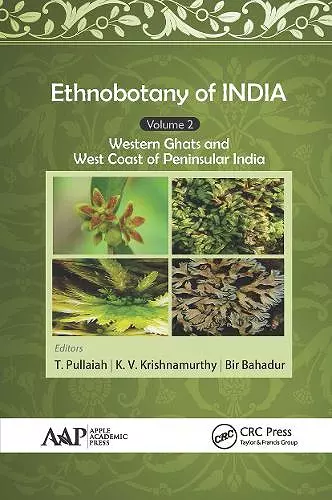Ethnobotany of India, Volume 2
Western Ghats and West Coast of Peninsular India
T Pullaiah author K V Krishnamurthy author Bir Bahadur author
Format:Paperback
Publisher:Apple Academic Press Inc.
Published:31st Mar '21
Currently unavailable, and unfortunately no date known when it will be back
This paperback is available in another edition too:
- Hardback£105.00was £105.00(9781771884044)

This volume explores the ethnobotany of various regions in India, highlighting topics such as traditional agriculture, pharmacognosy, and conservation strategies, while showcasing the country's rich cultural knowledge systems.
Ethnobotany of India, Volume 2 is the second installment in a comprehensive five-volume series that explores the rich tapestry of ethnobotanical knowledge across various regions of India. This volume aims to consolidate significant information about the relationships between people and plants, highlighting the cultural and ecological importance of these connections. India's diverse cultural heritage is reflected in its varied knowledge systems, making it a crucial area of study for understanding traditional practices and beliefs.
The authors, chosen for their expertise in the field, provide a thorough overview of key topics within ethnobotany. These subjects include ethnoecology, which examines the interactions between local communities and their environments, and traditional agriculture, which showcases indigenous farming practices that have been passed down through generations. Additionally, the volume delves into cognitive ethnobotany, exploring how different cultures perceive and categorize plant life, as well as traditional pharmacognosy, which focuses on the use of plants for medicinal purposes.
Furthermore, the book addresses vital themes such as ethnoconservation strategies, which aim to preserve traditional knowledge and practices, and bioprospection, the search for valuable biological resources informed by indigenous knowledge. The protection of ethnobotanical knowledge is also a critical aspect discussed, emphasizing the need for safeguarding these valuable insights for future generations. Overall, this volume serves as an essential resource for anyone interested in the intersection of culture, ecology, and botany in India.
"This volume will serve as a pragmatic and authoritative reference for conservationists and pharmacologists working in India. . . . Readers will also find it credible as a de facto gap and trend analysis for ethnobotanical studies in the Western Ghats. . . . Over the past two decades, there has been an exponential increase in ethnobotanical studies throughout South Asia. Often published in local journals or by independent presses, however, their findings rarely receive the attention needed to drive both innovation and policy. The five-volume Ethnobotany of India series addresses this by extensively reviewing plant resources from the subcontinent. Volume 2 focuses on ethnobotanical knowledge from the Western Ghats and West Coast of Peninsular India, providing not only historical context but also ethnographic insight into the region. The Western Ghats are one of Earth’s most breathtaking biocultural hotspots. Extending south from the humid metropolis of Mumbai through the western tip of Peninsular India, their rolling hills house diverse communities that have (re)shaped each other through time. Volume 2 presents these dynamics in 13 curated chapters structured around standard ethnobotanical tables. However, it is unique in that it supplements them with additional information on global processes, including historical trade in the Arabian Sea. Other chapters shed light on the value of place when assessing plant use and management. Of note, a section on sacred forests highlights mores that may promote community-based conservation of medicinal plants. . . . "
—Economic Botany, reviewed by Alexander R. O’Neill, Duke University, Durham, NC, USA
ISBN: 9781774631201
Dimensions: unknown
Weight: 680g
368 pages